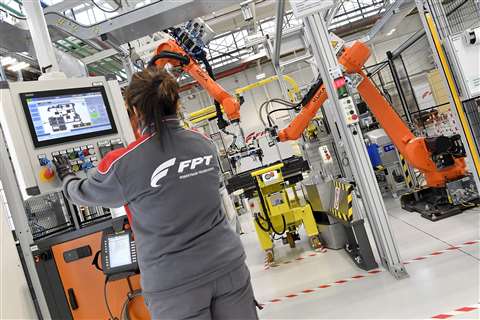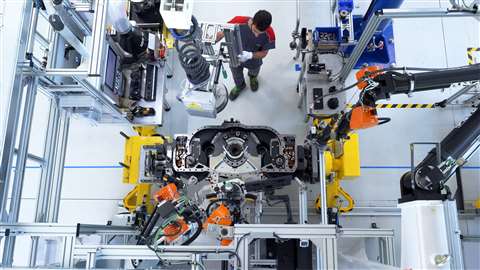FPT Industrial inaugurates ePowertrain plant
19 October 2022
Batteries, e-axles and e-drives being produced in FPT Industrial plant in Turin, Italy
FPT Industrial (a brand of the Iveco Group) inaugurated its new ePowertrain plant dedicated to the production of the brand’s electric range including electric axles, electric central drives and battery packs for light commercial vehicles, minibuses, and buses.
With a total area of 15 000 m2, the ePowertrain plant features three parallel production lines dedicated to battery pack assembly, electric central drives, and HCV electric axle production.

The battery pack assembled in Turin is the eBS 37 with 37-kWh capacity; it is a lithium-ion, water-cooled battery developed by Microvast for light-duty commercial vehicles and minibuses.
From 2023, the plant will also assemble the eBS 69 battery type for buses; this unit will be installed in the Iveco Crossway Low Entry Electric bus.
FPT Industrial and Microvast signed an agreement in 2019 for industrial and commercial cooperation on high-voltage battery packs for commercial vehicles. This lead to the contract with Iveco for the supply of the battery solution for the Crossway Low Entry Electric bus.
The electric central drive eCD 140 is suitable for minibuses and light-duty trucks up to 8 ton GVW. It features one electric motor delivering 140 kW peak power and 1600 Nm peak torque. This component will be adopted by the new Iveco Daily Electric van.
The electric axle eAX 840-R has been designed for the Nikola Tre BEV heavy-duty truck, already on the market in the USA. It features two electric motors delivering peak power of 840 kW and peak wheel torque of 45 000 Nm and is suitable for heavy-duty commercial vehicles up to 44 ton GVW.
At full capacity the Turin ePowertrain plant will produce over 20 000 electric axles and over 20 000 battery packs per year.
The plant includes production line innovations and Industry 4.0 technologies that enable the automatic collection and analysis of all data to monitor and improve safety, quality and productivity.
All production processes are based on highly automated warehouses for the management of components, and developed through electronically controlled assembly stations.
Augmented and virtual reality are used to reduce design time for production lines by simulating operational outcomes before physical installation; other tecniques being used are: 3D printing and “Smart Observer” systems based on intelligent sensors; 3D scanners for metrology-grade measurements; 3D reality simulators; and cooperative robots.
Cooperative robots and Automated Guided Vehicles improve ergonomics and safety and make the operators’ job easier and less stressful.
Cloud quality checks allow instant detection of problems, while end-of-line checks certify the conformity of the product both in terms of configuration, performance and safety. In particular for the HCV electric axles assembly, end-of-line static and dynamic tests are performed on all components being completed and energy is recuperated during braking.
Also on the HCV electric axles line, a station with light signals supports the operator by clearly indicating which component is to be selected and where to mount it, thus helping achieve the zero-error target.

On the battery assembly line, dielectric carpets protect operators against possible electric dispersions, while thermal imaging cameras automatically measure battery temperatures, immediately reporting any deviation from the norm.
“Our team is called to acquire a new mindset to approach the new challenges of e-mobility, and new skills to relate with the Industry 4.0 environment,” said Alessandro Sezza, plant manager at the Turin site. “At the Tech Academy, we prepare our people for a completely new process, where it is fundamental to manage the information flows provided by robots and automated tools.”
Sezza added that the new production site is the first totally carbon-neutral Iveco Group plant, achieving its targets by offsetting its CO2 emissions with the purchase of energy from renewable sources and carbon credits. In addition, the plant generates energy with solar panels installed on the façade and with innovative technologies, such as the “mini-wind tower” and the “smart flower”.
The facility also hosts the Iveco Group Sustainability Garden, a 6 000 m2 internal space planted with 100 drought-resilient plants of native species with great CO2 absorption capacity.
STAY CONNECTED




Receive the information you need when you need it through our world-leading magazines, newsletters and daily briefings.
POWER SOURCING GUIDE
The trusted reference and buyer’s guide for 83 years
The original “desktop search engine,” guiding nearly 10,000 users in more than 90 countries it is the primary reference for specifications and details on all the components that go into engine systems.
Visit Now
CONNECT WITH THE TEAM









